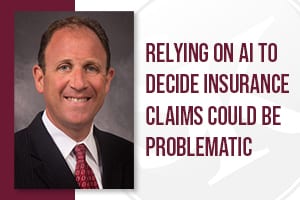 A bill is being developed in Harrisburg to address concerns about the increasing use of artificial intelligence (AI) in the insurance industry. The bill, to be introduced by Rep. Arvind Venkat, aims to require insurance companies to disclose when they use AI in their claims process. The use of AI in insurance claims may have the potential to streamline processes, but it could also raise new legal and ethical challenges.
A bill is being developed in Harrisburg to address concerns about the increasing use of artificial intelligence (AI) in the insurance industry. The bill, to be introduced by Rep. Arvind Venkat, aims to require insurance companies to disclose when they use AI in their claims process. The use of AI in insurance claims may have the potential to streamline processes, but it could also raise new legal and ethical challenges.
The bill comes in response to instances where health insurance claims were denied with only minimal human review, sometimes as short as 1.2 seconds per case. The involvement of AI in the insurance claims process could lead to novel legal disputes involving critical issues, such as the accuracy and reliability of AI tools, the potential for bias in training datasets, and the transparency of algorithms.
Relying on AI to Decide on Complex Medical Claims Raises New Concerns
Lawyers and experts in the insurance industry are raising questions about the extent to which AI can be relied upon, especially in complex cases like medical procedures. There is an argument that human expertise and judgment should still play a role in evaluating claims to avoid potential issues of bad faith or unfair treatment.
Schmidt Kramer personal injury attorney Scott Cooper, who focuses on insurance litigation, spoke to the Legal Intelligencer about how relying on AI to do things like surgical pre-authorizations could be problematic. One example Cooper used was if an individual needed to have an emergency laminectomy (a surgical procedure that removes one or more vertebrae) and a review of the claim by AI resulted in denied coverage. If issues arose from that denial, it is the carrier that could be responsible for those complications.
Cooper says, “If your AI is only so good, it’s going to lead to more claims of bad faith, and open insurance companies up to a lot of litigation.”
Should Disclosure of AI Use in Insurance Claims Be Mandatory?
The article highlights the potential need for accessing the underlying algorithms and training materials used to develop AI systems in case of disputes. However, this could be complicated by concerns around proprietary information and the technical expertise needed to decipher complex algorithms.
The bill proposed in Harrisburg seeks to address these concerns by mandating disclosure of AI use, requiring clear definitions of algorithms, and involving specialized healthcare professionals in the review of claims initially evaluated by AI.
In summary, the article discusses the emergence of AI in the insurance industry, its potential benefits, and the legal challenges it presents. The proposed bill aims to regulate AI’s role in insurance claims, ensuring transparency, fairness, and accountability in the decision-making process.

